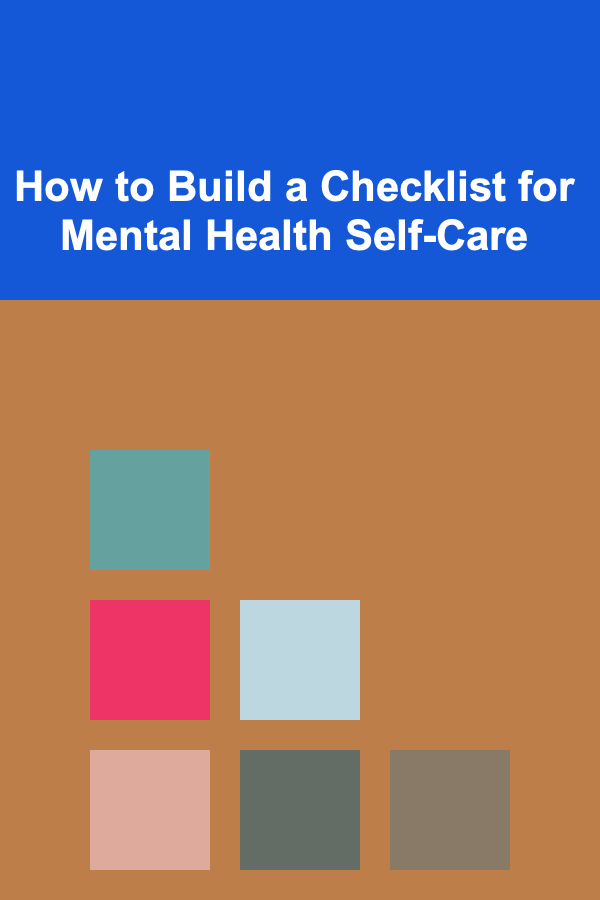
How to Build a Checklist for Mental Health Self-Care
ebook include PDF & Audio bundle (Micro Guide)
$12.99$10.99
Limited Time Offer! Order within the next:

Mental health is as important as physical health, yet it is often overlooked in our fast-paced, high-stress world. Taking care of your mental health is essential for living a balanced, fulfilling life. The first step toward better mental health is developing a solid and actionable mental health self-care routine. A well-structured checklist can help ensure that you prioritize your mental well-being on a daily, weekly, and monthly basis.
In this guide, we'll explore how to build a personalized and actionable checklist for mental health self-care, breaking it down into key elements that can make a meaningful difference in your mental well-being.
Identify Your Emotional and Mental Needs
Before building your checklist, it's essential to understand your emotional and mental needs. This requires self-awareness and honest reflection. Different people have different mental health needs, and your self-care checklist should reflect what works best for you.
Key questions to ask yourself:
- How am I feeling emotionally? Are you experiencing stress, anxiety, sadness, or any other emotion that needs attention?
- What aspects of my life are causing me mental strain? Work, relationships, health, or external pressures?
- How do I usually cope with these emotions? Do I have healthy coping mechanisms, or do I tend to avoid or suppress my feelings?
Actionable Steps:
- Take time to reflect on your current emotional state. Journaling or simply sitting in silence can help you get in touch with how you're feeling.
- Be honest with yourself. Acknowledge what you're struggling with---whether it's burnout, anxiety, or sadness. Understanding your starting point is key.
Include Essential Self-Care Practices
Your checklist should include daily self-care activities that directly support your mental health. The goal is to build habits that nourish your mind, body, and soul.
Key Areas to Focus On:
- Physical Care: Mental health and physical health are deeply intertwined. Regular exercise, proper nutrition, and enough sleep are fundamental to mental well-being.
- Social Connections: Maintaining healthy relationships with family, friends, and colleagues can provide emotional support.
- Stress Management: Regular relaxation techniques and stress management practices can help mitigate anxiety and promote inner peace.
- Mindfulness and Mental Rest: Activities like meditation, mindfulness exercises, and simply taking mental breaks can help calm your mind.
Actionable Steps:
- Physical Care: Set a goal for physical activity (e.g., 30 minutes of exercise daily), ensure you are eating balanced meals, and aim for at least 7-8 hours of sleep.
- Social Connections: Schedule regular check-ins with loved ones, whether it's a phone call, a virtual meet-up, or an in-person hangout.
- Stress Management: Practice breathing exercises, progressive muscle relaxation, or yoga to reduce stress. Plan a "wind-down" routine to manage the stresses of daily life.
- Mindfulness: Incorporate mindfulness practices such as meditation, journaling, or simple breathing techniques to help you remain present.
Prioritize Mental Health Hygiene
Just as you maintain personal hygiene for your body, mental health hygiene is equally crucial. This involves creating habits and routines that preserve your mental health on a deeper level.
Key Areas of Mental Health Hygiene:
- Limiting Social Media: Constant exposure to social media can negatively affect your mental health. Setting boundaries can help reduce stress and anxiety.
- Setting Boundaries: Saying no when you need to, protecting your time, and managing your emotional energy are essential for maintaining mental well-being.
- Reducing Toxicity: Recognize and limit your exposure to negative people, environments, or media that affect your mental health.
Actionable Steps:
- Limit Social Media: Set daily limits for social media use and avoid using your phone during designated rest times (such as before bed).
- Set Boundaries: Practice saying no to commitments or activities that drain your energy or increase stress. Communicate your needs clearly with others.
- Reduce Toxicity: Identify areas in your life where negativity is affecting you and take steps to distance yourself from those situations, whether it's social media, work environments, or toxic relationships.
Integrate Activities that Bring Joy and Fulfillment
It's important to include activities that bring you joy and fulfillment in your self-care checklist. These activities help recharge your mental batteries, provide a sense of purpose, and allow you to experience positive emotions.
Key Questions to Consider:
- What activities bring me joy and relaxation?
- When was the last time I did something just for myself?
- How can I make time for fun and creativity in my life?
Actionable Steps:
- Schedule time for hobbies and activities you enjoy, whether it's painting, reading, gardening, or cooking. The goal is to make space for creativity and play.
- Consider starting a new activity or rediscovering an old passion to inject fun and satisfaction into your routine.
- Reflect on what gives you fulfillment and how you can prioritize these activities regularly.
Include Professional Support When Needed
While self-care is a critical part of maintaining mental health, there are times when professional support is needed. Seeking help from a therapist, counselor, or coach can provide valuable tools, perspectives, and strategies for managing mental health challenges.
Key Questions to Ask:
- Do I feel like I need professional help to manage my mental health?
- Have I experienced persistent feelings of sadness, anxiety, or stress that I haven't been able to manage on my own?
- Am I open to seeking guidance from a professional if needed?
Actionable Steps:
- If you've been feeling persistently down, anxious, or overwhelmed, consider reaching out to a licensed mental health professional.
- Schedule regular therapy sessions or counseling appointments to support your mental health journey.
- Stay open to seeking help---there's no shame in needing support, and it can be a crucial part of recovery and well-being.
Review and Adjust Your Checklist Regularly
Mental health self-care is not a one-size-fits-all approach, and what works for you today may not be as effective tomorrow. Regularly reviewing and adjusting your checklist ensures that your mental health practices remain relevant and supportive to your evolving needs.
Key Questions to Ask:
- Have my emotional needs changed?
- Do I need to adjust any of my self-care practices?
- Are there new habits or practices I want to try?
Actionable Steps:
- Set aside time each month to review your mental health checklist. Ask yourself whether the practices are still helping you feel balanced and supported.
- Adjust your routine as needed. Try new techniques, activities, or strategies if you feel like something is no longer working.
- Don't be afraid to make changes as you grow and evolve, ensuring that your self-care routine always serves you best.
Conclusion
Creating a mental health self-care checklist is an essential part of maintaining emotional well-being in today's hectic world. By understanding your emotional needs, incorporating self-care practices, and seeking professional support when necessary, you can create a routine that supports your mental health over the long term.
Remember, mental health is an ongoing journey, not a destination. Be patient with yourself, make adjustments as needed, and always prioritize your emotional well-being. By building a comprehensive checklist that includes daily practices, self-reflection, and professional support, you are taking a crucial step toward better mental health and a more balanced life.

Becoming a Successful Cybersecurity Analyst: Strategies for Defending Digital Assets
Read More
How to Choose the Right Party Supplies for Your Home Event
Read More
How to Create a Pet-Friendly Rental Property That Attracts More Tenants
Read More
How to Incorporate Inspirational Décor into Your Sewing Space
Read More
How to Provide Pet-Approved Activities for Small Apartments
Read More
10 Tips for Organizing Your Quilting Fabric Stash
Read MoreOther Products

Becoming a Successful Cybersecurity Analyst: Strategies for Defending Digital Assets
Read More
How to Choose the Right Party Supplies for Your Home Event
Read More
How to Create a Pet-Friendly Rental Property That Attracts More Tenants
Read More
How to Incorporate Inspirational Décor into Your Sewing Space
Read More
How to Provide Pet-Approved Activities for Small Apartments
Read More